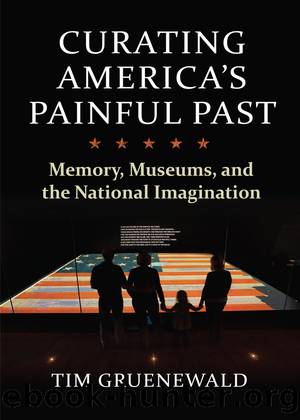Curating America's Painful Past by Tim Gruenewald

Author:Tim Gruenewald [Tim Gruenewald]
Language: eng
Format: epub
ISBN: 9780700632404
Publisher: University Press of Kansas
Published: 2021-09-17T00:00:00+00:00
Blind Spots: Forgetting and the National Imagination
Memory is selective, and any museum must choose. Narrative representation in exhibitions requires that the curator select from the entirety of experience and structure what was chosen in order to tell a story. This is the nature of narrative itself. However, the selection inherent to public history demands critical evaluation. The above-discussed absence of the first president at the NMAAHC is one example. Several more significant omissions facilitate the integration of African American past with dominant national ideologies. Forgetting is a necessary component of both individual and collective memory, but, as Paul Ricoeur has reminded us, forgetting can be dangerous when it is employed to suppress memories in order to strengthen a collective identity.56
One of the overarching motivations for this study is the absence of memorials to victims of the United States on the National Mall. Among the most obvious examples in the local context would be the lack of memorialization of enslaved people who constructed some of the iconic buildings on the Mall itself. The buildings and monuments, which were built with slave labor, would be obvious choices for remembering slavery. Some of the nationâs most prominent symbols are among them, including the White House and the Capitol Building. The history of those buildingsâ construction should be impossible to miss for the tourists visiting these sites. This knowledge would inevitably recalibrate the symbolic meaning of those buildings and the National Mall, which would at the same time reconfigure the national mythology and enable a more complex appreciation of the painful past in America. Of course, this would require markers to be placed prominently so that they could not be overlooked. To date, no such marker exists anywhere outside on the National Mall.57 The first candidate would be one of the most iconic buildings in the United States: the White House, which was built using both free and enslaved African Americans.58 This simple fact, which is not debated among historians, was largely unknown to the general public until Michelle Obama said, âI wake up every morning in a house that was built by slaves,â during her nationally televised speech at the 2016 Democratic National Convention in Philadelphia.59 The debate over her statement in many conservative media outlets betrayed that this was not merely an unknown but to many an unwelcome historical fact.60 Of course, it should not be solely the NMAAHCâs burden to tell such stories. They are best remembered at the sites where they took place. Nevertheless, since this history is not given adequate space elsewhere in the capital, the museum should begin remembering the specific impact of slavery on the Mall. To be fair, the museum dedicates one image, a few bricks from the White House, one sandstone from the Capitol Building, and three explanatory sentences to this topic. However, this is a tiny display in the larger context of the exhibition, easily overlooked, and hardly adequate to the symbolic import of this space in the nationâs history. None of the details
Download
This site does not store any files on its server. We only index and link to content provided by other sites. Please contact the content providers to delete copyright contents if any and email us, we'll remove relevant links or contents immediately.
Cecilia; Or, Memoirs of an Heiress — Volume 1 by Fanny Burney(32559)
The Great Music City by Andrea Baker(32020)
Cecilia; Or, Memoirs of an Heiress — Volume 2 by Fanny Burney(31957)
Cecilia; Or, Memoirs of an Heiress — Volume 3 by Fanny Burney(31943)
We're Going to Need More Wine by Gabrielle Union(19049)
All the Missing Girls by Megan Miranda(16033)
Pimp by Iceberg Slim(14513)
For the Love of Europe by Rick Steves(14135)
Bombshells: Glamour Girls of a Lifetime by Sullivan Steve(14077)
Talking to Strangers by Malcolm Gladwell(13374)
Norse Mythology by Gaiman Neil(13371)
Fifty Shades Freed by E L James(13244)
Mindhunter: Inside the FBI's Elite Serial Crime Unit by John E. Douglas & Mark Olshaker(9345)
Crazy Rich Asians by Kevin Kwan(9293)
The Lost Art of Listening by Michael P. Nichols(7507)
Enlightenment Now: The Case for Reason, Science, Humanism, and Progress by Steven Pinker(7315)
The Four Agreements by Don Miguel Ruiz(6766)
Bad Blood by John Carreyrou(6623)
Weapons of Math Destruction by Cathy O'Neil(6282)
